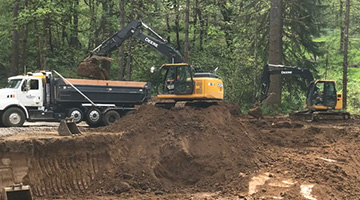Comprehensive Excavation Techniques: Grasping the Principles for Success
The careful planning, precise execution, and meticulous attention to detail needed in excavation jobs demand an extensive method that encompasses various basic facets. The real proficiency exists not just in comprehending these principles however in effortlessly integrating them to browse the intricacies of excavation jobs with skill.
Understanding Excavation Project Planning

The preliminary stage of any excavation project is the planning phase, where crucial decisions are made that can dramatically influence the result of the project. Recognizing the task scope, budget plan, and timeline restrictions is crucial for creating a comprehensive excavation plan that guarantees the project's success.
One secret element of excavation job planning is the advancement of an in-depth timeline that details the series of turning points, activities, and due dates. This timeline works as a roadmap for the task group, enabling them to track progress and make required adjustments to guarantee the project stays on timetable. In addition, a distinct budget plan that accounts for all expenses, consisting of devices leasing, labor expenses, and materials, is vital for preventing expense overruns and delays. By very carefully thinking about all these elements during the planning stage, excavation jobs can be executed effectively and efficiently, leading to effective end results.
Dirt Analysis and Website Evaluation
Carrying out comprehensive dirt analysis and site analysis is an essential action in the prep work stage of any excavation task. Dirt analysis involves determining the structure, structure, and buildings of the soil at the excavation site. This details is essential for recognizing the soil's bearing capability, wetness content, and possibility for disintegration, which are essential variables in figuring out the excavation approaches and devices needed for the task.
Site examination goes past dirt evaluation and includes a broader evaluation of the total website conditions. This analysis consists of determining any possible risks, such as below ground energies, ecological worries, or unsteady surface, that might affect the excavation procedure. By extensively assessing the website, task managers can create reliable excavation approaches that focus on safety and security, performance, and environmental defense.
Utilizing advanced innovations like ground-penetrating radar, soil sampling, and drone surveys can enhance the accuracy and effectiveness of soil analysis and site examination. Investing time and resources in these initial actions can inevitably conserve time and stop expensive delays or complications during the excavation procedure.
Devices Choice and Utilization
Effective excavation jobs depend greatly on strategic tools option and application to ensure optimal performance and productivity. Selecting the best equipment for the work is important in optimizing performance and reducing downtime. Elements such as the kind of soil, depth of excavation, and task scope play a substantial function in determining one of the most suitable devices click to find out more for the task handy.

Along with choosing the proper tools, proper use is crucial to job success. Operators must be trained to take care of why not find out more the equipment securely and effectively - lancaster excavation. Normal maintenance checks and prompt repair services help prevent breakdowns and make sure consistent efficiency throughout the task
Precaution and Regulations Conformity
In the world of excavation jobs, prioritizing safety and security measures and compliance with guidelines is critical to ensuring a legitimately sound and safe and secure operational atmosphere. Precaution incorporate an array of methods, including performing thorough site analyses, carrying out appropriate signage and obstacles, and supplying sufficient safety training for all employees associated with the excavation process. Adherence to regulations, such as OSHA needs in the United States, ensures that the excavation job meets the essential requirements to safeguard employees, onlookers, and the surrounding environment.

Monitoring Progression and Adjusting Approaches
Just how can forecast managers effectively track the advancement of excavation tasks and adjust their methods appropriately to optimize end results? Tracking progress is important for ensuring that excavation projects stay on track and fulfill target dates. Job managers can make use of numerous devices and methods to track development, such as daily progress reports, normal site evaluations, and progressed surveillance innovations like drones and general practitioners tracking systems. By continually monitoring the job's advancement, supervisors can identify any kind of prospective delays or concerns early and take proactive procedures to address them.

Final Thought
To conclude, mastering the basics of thorough excavation approaches is crucial for the success of any type of project. By comprehending task preparation, analyzing dirt and site conditions, selecting ideal devices, following safety laws, and keeping track of progress, job managers can make certain a smooth and effective excavation process. Implementing these methods will bring about successful end results and reduce possible dangers or setbacks throughout the excavation project.
The first phase of any kind of excavation project is the preparation stage, where essential decisions are made that can significantly affect the outcome of the job. Understanding the job extent, timeline, and budget plan constraints is important for developing an extensive excavation strategy that makes certain the project's success.
How can forecast supervisors properly track the improvement of excavation tasks and adjust their strategies as necessary to optimize end results? By closely checking progress and being ready to adjust strategies, project managers can improve the total success of excavation projects.
By understanding project planning, examining dirt and site conditions, picking proper equipment, complying with security policies, and monitoring development, project supervisors can ensure a smooth and efficient excavation procedure.